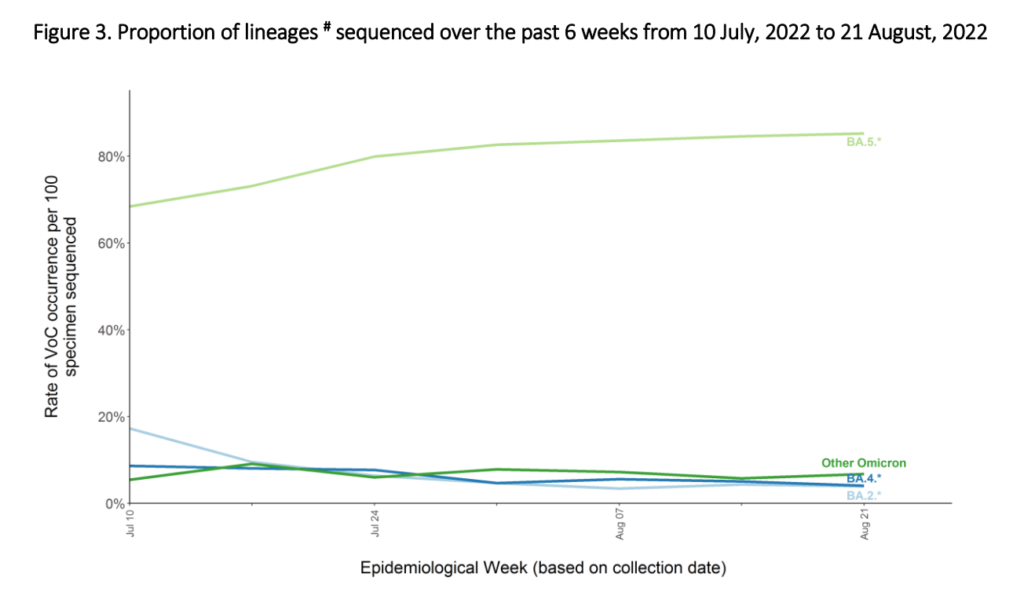Press Briefing
The province had a press briefing on Tuesday (6 September) on the fall booster campaign. There were not a lot of surprises. Here’s what they said.
- They talked about the timing.
- They said that the boosters are most effective in the eight to twelve weeks after the shot. Because flu is worst in Nov/Dec, the health care system is going to be most stressed in Nov/Dec. Taking those together, October is the best time to get a COVID shot.
- NB: This reasoning assumes that flu will be worst in Oct/Dec, which is absolutely not a given this year. See discussion in today’s General post which shows that flu is not acting normally this year.
- They expect the regular influenza vax to arrive in the first week of October.
- They said that flu was bad in Australia this year, with the implication that they expect it to be bad here, too.
- They encouraged people to get flu shots at the same time as they get their COVID booster.
- They said that the boosters are most effective in the eight to twelve weeks after the shot. Because flu is worst in Nov/Dec, the health care system is going to be most stressed in Nov/Dec. Taking those together, October is the best time to get a COVID shot.
- Bivalent boosters are coming and they are not unusual at all. Polio and influenza vax are also multi-strain vaccinations.
- Health Canada approved a vax with BA.1 spike mRNA (and also COVID Classic mRNA) from Moderna. The US approved Pfizer and Moderna with BA.5 spike proteins, but they are all Omicron, there’s not that much difference.
- They expected 110K to land in-province the next day (Wed 7 Sep). They hope to get a bigger tranche next week.
- They are available for people over 18 and to some clinically extremely vulnerable children. Pfizer requested authorization for people as young as 12, but that application is still making its way through the system. (It was pretty clear that they expect it to be approved.)
- Everybody 5 and up was eligible for a booster, but children can’t get the bivalent booster, at least not yet.
- For most people, you need to wait six months since your previous shot. If you are highly vulnerable for some reason (immunocompromised, elderly, disabled, indigenous, etc.), there is an outbreak, or they want to do everybody at once (e.g. at a LTCH) then maybe they will give them earlier than six months. Still, most people should expect to wait six months from their last booster.
- Invitations will come through the GetVaccinated system, via email or text, like before. They will prioritize by vulnerability and time since last shot, like before. Health care workers will be bumped up in priority, like before.
- They will start giving out the bivalent boosters on 19 September. (Note that it will go to the most most most vulnerable first.)
- Of course, if you don’t want the bivalent booster, you can have one of the other shots — Pfizer Original Booster, Moderna Original Booster, Janssen, Novavax, whatever. (NB: I am still recommending that you at least consider Novavax as a booster. Nobody should get Janssen — it has worse side effects and is not as effective.)
- Boosters are going to be given directly by health authorities for hard-to-reach populations, mostly congregate housing (prisons, migrant workers, LTCH, shelters) but also disabled and homebound.
- They are going to offer flu shots at the same time, which makes a lot of sense: make one visit instead of two. This means, however, that they are going to wait until the high-dosage flu vax gets here before they start. They expect the high-dosage flue vax to get here at the end of September.
- For everybody else, there will be vax in about 1100 pharmacies and 100 Health Authority clinics on any given day. Some of them will be mass-vax clinics (like we had in summer 2021).
- At peak, they will have capacity to vaccinate 250K-280K people per day.
- They expect clinics to run for ten weeks. At the end of that — mid November — the health authorities will withdraw and leave it normal vaccinations to the pharmacies. (The HAs will still work on reaching the hard-to-reach.)
- They said that you should wait three to six months after having COVID before you get a COVID booster.
- You absolutely should get vaccinated even if you were sick. Being sick frequently doesn’t give you good protection, especially with Omicron. (Getting sick PLUS having vaccination gives really good protection, though.)
Other things that came up:
- Just under 60% of the 5-11 year/olds have gotten one dose; just under 50% have gotten two doses.
- 15,800 health care workers were out sick last week. (NB: I presume that 15,800 people were sick for at least one day, if they are reporting the same way that they used to.) They said that’s significantly more than the historical average for this time of year. (NB: For comparison, in the 2022-05-12 press briefing, Dix mentioned that 17K or 18K HCW were sick for at least one day the previous week, and that was stressing the system.)
- Dr. Henry talked a little bit about how we could keep ourselves safe, but the thing she leaned on hardest was “stay home if you are sick”, completely missing that that doesn’t keep ME healthy, it keeps OTHER PEOPLE healthy. (Not that I’m against keeping other people healthy, but we have precious little to help keeping our own selves from getting sick aside from masking and hiding.)
- Someone asked what’s going to happen to all the old (not bivalent) shots that we got. Dr. Henry pointed out that BC has been careful about what they order, so we don’t actually have a lot of “old” vax. Thus she cleverly shifted the problem of “what do we do with the old formula vax” to the federal government.
- They are going to talk about seroprevalence next week.
- Q: Why has vax uptake been so awful in the littlest kids (~10%)? A: We talked to parents, and partly it’s timing: there’s just a shitton of stuff going on in the summers. Partly they want to wait and see how well it works in other peoples’ kids. But we’re going to do a targeted ad campaign for them.
- Q: How are you going to convince people to get a second booster when 1.3M haven’t gotten their first booster? A: We’ve talked to people, and a large number haven’t gotten the first booster because of a recent infection. About a third to 40% of that 1.3M have said they are open to getting another booster.
Statistics
This week’s BC CDC weekly report said that in the week ending on 3 September August there were: +617 cases, +147 hospital admissions, +25 ICU admissions, +22 all-cause deaths.
This week’s report said that the previous week (data through 27 August) there were: +651 cases, +198 hospital admissions, +27 ICU admissions, +43 all-cause deaths.
Last week’s BC CDC weekly report said that in the week ending on 27 August there were: +651 cases, +160 hospital admissions, +25 ICU admissions, +33 all-cause deaths.
Last week’s report said that the previous week (data through 20 Aug) there were: +737 cases, +213 hospital admissions, +44 ICU admissions, +45 all-cause deaths.
The BC CDC dashboard says that there are 324 in hospital / 22 in ICU as of 8 September 2022.
Charts
From the BC CDC Situation Report:



From the BC Variants of Concern report:


